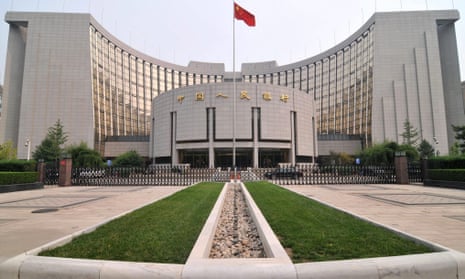China’s central bank has warned of further volatility in the yuan but reiterated that Beijing had no intention of sparking a “currency war” following a series of shock devaluations last week.
The chief economist at the People’s Bank of China, Ma Jun, said the Chinese government had “no intention or need to participate in a currency war”.
In a concerted effort to play down fears of tit-for-tat devaluations with the US, Europe and Japan, he said Beijing would intervene only in exceptional circumstances to counteract excessive volatility.
The yuan’s drop last week, and its increased flexibility as a result, could help sharply reduce the possibility of similar adjustments in future, Ma said. However, he added it was more likely there would be “two-way volatility”, or appreciation and depreciation of the national currency in response to economic ups and downs. Referring to the possibility of further interventions, he said: “In the future, even if the central bank needed to intervene in the market, it may be in either direction.”
Ma’s intervention, in an email sent to Reuters, came after a surprise devaluation by the Chinese authorities last week that sparked panic-selling on the world’s stock markets.
A near 2% cut in the yuan against the US dollar on Tuesday was matched the following day by a further devaluation, only for the currency’s reference rate, which is set each day, to be raised slightly on Thursday, stabilising the situation at the end of the week.
Investors, already concerned after a long period of weak economic data coming out of China, had feared that desperate officials in Beijing were prepared to force down the yuan’s value as the only way to turnaround the country’s fortunes.
Former US ambassador to China, Jon Huntsman, told CNN that Washington would be right to voice concern about a deliberate policy of devaluations by Beijing.

“China is no longer an average player in the global economy. They’re the second largest economy in the world. And when you have the devaluation of 2% right off the bat automatically – you’re going to have a higher cost burden on the exports from the United States to Asia, and to one of our largest export markets, to say nothing of the impact it’s going to have on the region.
“So when you look at the immediate import that it had on currencies – you get a sense as to why people are very, very frustrated with China,” he said. Ma’s comments are likely to be interpreted as an attempt by China’s central bank to regain control of the yuan ahead of trading this week, when analysts expect further cuts in the yuan’s value.
Several analysts said last week that the Chinese wanted to push down the value of the yuan to make its exports cheaper without antagonising rival trading blocs. A 10% devaluation against the US dollar was cited as the target of the PBoC to regain what it sees as a competitive rate with Washington.
Last month, China’s authorities came under fire internally for their handling of a stock market boom that saw millions of investors lose their savings after sentiment turned sour and the surge in share values quickly became a rout. To prevent a collapse in the Shanghai market, the authorities were forced into an embarrassing climbdown that involved abandoning tough lending rules designed to prevent traders from excessive borrowing.
Ma also said that he expected the economy to grow by about 7% this year – in line with the government’s target.
On Friday, the International Monetary Fund welcomed the PBoC’s
adjustments to the reference rate mechanism and China’s security regulator indicated it was prepared to stabilise the stock markets “for a number of years” through a state-backed fund. The China Securities Regulatory Commission has organised a so-called “national team” of state-owned brokers and fund managers, who have pledged not to sell shares until the Shanghai Composite index returns to 4,500 points.
According to one Chinese media report last month, China’s biggest banks lent 1.3tn yuan (£134bn) in an attempt to halt the stock market meltdown. It was reported that 17 commercial banks had provided the cash for the state-backed China Securities Finance (CSF), which loans money to investors for buying shares in a practice known as margin lending.

Comments (…)
Sign in or create your Guardian account to join the discussion